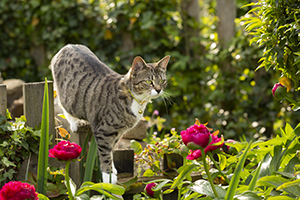Lilies are a favourite flower of many, often adorning our homes and gardens. However, many pet owners are unaware of the significant danger these flowers pose to their beloved furry friends. While lilies may seem harmless, certain species can be highly toxic to cats and, to a lesser extent, dogs.
In this blog post, we will explore the dangers of lily poisoning, common symptoms to watch for, preventative measures, and what to do if you suspect your pet has been exposed.
Toxic lilies for pets
Several species of lilies are toxic to cats, including Easter lilies, Tiger lilies, Daylilies, and Asiatic lilies. All parts of these plants, including the petals, leaves, stems, and pollen, contain toxins that can cause severe kidney damage and, in some cases, be fatal if ingested by cats. While dogs are generally more resistant to lily toxicity, ingestion can still cause stomach upset and discomfort.
Common symptoms of lily poisoning
It is crucial to be familiar with the signs of lily poisoning to ensure you can get your pet the help it needs quickly. Symptoms may include:
- vomiting
- loss of appetite
- lethargy
- drooling
- dehydration
- frequent urination
- seizures.
If you notice any of these signs and suspect your pet has come into contact with lilies, seek immediate veterinary assistance from Avonvale Veterinary Centres in Warwickshire.
Preventative measures
Prevention is key when it comes to protecting your pets from lily poisoning. Consider the following precautions:
- Educate yourself: Familiarise yourself with toxic lily species and ensure that everyone in your household is aware of the dangers they pose to pets.
- Avoid lilies in your home: If you have cats, it is best to completely avoid having lilies inside your home. Opt for pet-friendly flowers and plants instead.
- Secure outdoor spaces: If you have lilies in your garden, make sure they are planted in areas inaccessible to your pets. Consider fencing off or creating barriers around lily beds.
- Inform others: Alert neighbours, friends, and family members who have pets about the dangers of lilies, encouraging them to take precautions as well.
What to do if your pet is exposed to lilies
If you suspect or know that your pet has ingested or come into contact with lilies, take immediate action:
- Remove the source: If you catch your pet in the act, carefully remove any plant material from their mouth, paws, or fur. Be cautious not to expose yourself to any potential toxins.
- Contact your vet: Contact your local Avonvale Veterinary Centres practice here or our out-of-hours emergency service immediately. Provide them with details about the exposure and any observed symptoms.
- Follow veterinary advice: Our vets will provide guidance on what to do and will likely recommend bringing your pet in for an examination and appropriate treatment.
Safe alternatives and floral substitutes
If you enjoy having flowers in your home but are concerned about pet safety, there are numerous pet-friendly options available. Consider using flowers such as roses, sunflowers, orchids, or daisies, which are non-toxic to cats and dogs. Alternatively, you might like to use artificial or silk flowers to add a touch of beauty without the risks associated with live plants.
Keep your pets safe from lily poisoning
Lily poisoning is a serious concern for cat owners and a potential risk for dogs as well. By raising awareness of the dangers, being vigilant about the flowers in your home and garden, and knowing the symptoms of lily poisoning, you can protect your pets from this hidden danger.







